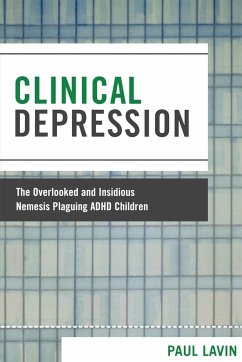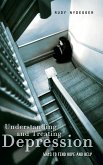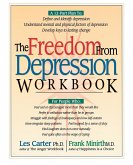- Broschiertes Buch
- Merkliste
- Auf die Merkliste
- Bewerten Bewerten
- Teilen
- Produkt teilen
- Produkterinnerung
- Produkterinnerung
Children with Attention Deficit Hyperactivity Disorder are in constant misdirected motion, unable to concentrate and complete assigned tasks, and behave impulsively.
Andere Kunden interessierten sich auch für
![Depression as a Psychoanalytic Problem Depression as a Psychoanalytic Problem]() Paolo AzzoneDepression as a Psychoanalytic Problem55,99 €
Paolo AzzoneDepression as a Psychoanalytic Problem55,99 €![Depression as a Psychoanalytic Problem Depression as a Psychoanalytic Problem]() Paolo AzzoneDepression as a Psychoanalytic Problem88,99 €
Paolo AzzoneDepression as a Psychoanalytic Problem88,99 €![Understanding and Treating Depression Understanding and Treating Depression]() Rudy NydeggerUnderstanding and Treating Depression54,99 €
Rudy NydeggerUnderstanding and Treating Depression54,99 €![The Freedom from Depression Workbook The Freedom from Depression Workbook]() Les CarterThe Freedom from Depression Workbook18,99 €
Les CarterThe Freedom from Depression Workbook18,99 €![Depression Depression]() Steven RichardsDepression92,99 €
Steven RichardsDepression92,99 €![DEPRESSIONEN ÜBERWINDEN - Die Macht der kognitiven Psychologie: Wie Sie Ihre Selbstzweifel und negativen Gedanken ein für alle Mal besiegen und zu einer enorm selbstsicheren Person werden DEPRESSIONEN ÜBERWINDEN - Die Macht der kognitiven Psychologie: Wie Sie Ihre Selbstzweifel und negativen Gedanken ein für alle Mal besiegen und zu einer enorm selbstsicheren Person werden]() Annika EbensteinDEPRESSIONEN ÜBERWINDEN - Die Macht der kognitiven Psychologie: Wie Sie Ihre Selbstzweifel und negativen Gedanken ein für alle Mal besiegen und zu einer enorm selbstsicheren Person werden15,90 €
Annika EbensteinDEPRESSIONEN ÜBERWINDEN - Die Macht der kognitiven Psychologie: Wie Sie Ihre Selbstzweifel und negativen Gedanken ein für alle Mal besiegen und zu einer enorm selbstsicheren Person werden15,90 €![Der Sinn des Wahnsinns Der Sinn des Wahnsinns]() Neel BurtonDer Sinn des Wahnsinns34,99 €
Neel BurtonDer Sinn des Wahnsinns34,99 €-
-
-
Children with Attention Deficit Hyperactivity Disorder are in constant misdirected motion, unable to concentrate and complete assigned tasks, and behave impulsively.
Hinweis: Dieser Artikel kann nur an eine deutsche Lieferadresse ausgeliefert werden.
Hinweis: Dieser Artikel kann nur an eine deutsche Lieferadresse ausgeliefert werden.
Produktdetails
- Produktdetails
- Verlag: University Press of America
- Seitenzahl: 106
- Erscheinungstermin: 7. April 2008
- Englisch
- Abmessung: 229mm x 152mm x 6mm
- Gewicht: 167g
- ISBN-13: 9780761838630
- ISBN-10: 0761838635
- Artikelnr.: 23329513
- Herstellerkennzeichnung
- Libri GmbH
- Europaallee 1
- 36244 Bad Hersfeld
- gpsr@libri.de
- Verlag: University Press of America
- Seitenzahl: 106
- Erscheinungstermin: 7. April 2008
- Englisch
- Abmessung: 229mm x 152mm x 6mm
- Gewicht: 167g
- ISBN-13: 9780761838630
- ISBN-10: 0761838635
- Artikelnr.: 23329513
- Herstellerkennzeichnung
- Libri GmbH
- Europaallee 1
- 36244 Bad Hersfeld
- gpsr@libri.de
By Paul Lavin
Chapter 1 Introduction Chapter 2 ADHD and Depression: Its Prevalence and
Symptoms Chapter 3 Depression: The Underlying Cooperation "Killer" Chapter
4 The Acquisition of Empathy: The First Step in Helping Depressed ADHD
Children Chapter 5 The Adult-Child Relationship: The Catalyst for Change
Chapter 6 More on the Adult-Child Relationship: Inspiring the ADHD Child to
Please You Chapter 7 Defensive Thinking: The Importance of Recognizing
Destructive Thought Patterns Chapter 8 Perception: Its Critical Importance
in Understanding ADHD Children Chapter 9 Why Perceptual Change is so
Difficult Chapter 10 Restructuring Errant Thinking: The Second Step in
Helping ADHD Children Chapter 11 The ADHD Child's Self-Concept: Its
Importance in Coping with Environmental Stressors Chapter 12 An ADHD Child
Can Strain a Marriage Chapter 13 The Acquisition of Confidence: How
Important Is This? Chapter 14 The Rudiments of Building Confidence Chapter
15 Affective Education: A Necessary Ingredient in Helping ADHD Children to
Cope with Depression Chapter 16 Developing an Internal Locus of Control:
The Antidote to Helplessness Chapter 17 Strength Identification: The
Building Block upon Which Hope Is Founded Chapter 18 Building a Behavior
Modification Program for Rearing Children to Develop an Internal Locus of
Control Chapter 19 An Internal Locus of Control Behavior Modification
Program in the Home Chapter 20 A Locus of Control Behavior Modficiation
Program in the School Chapter 21 Summary and Conclusions Part 22
Bibliography
Symptoms Chapter 3 Depression: The Underlying Cooperation "Killer" Chapter
4 The Acquisition of Empathy: The First Step in Helping Depressed ADHD
Children Chapter 5 The Adult-Child Relationship: The Catalyst for Change
Chapter 6 More on the Adult-Child Relationship: Inspiring the ADHD Child to
Please You Chapter 7 Defensive Thinking: The Importance of Recognizing
Destructive Thought Patterns Chapter 8 Perception: Its Critical Importance
in Understanding ADHD Children Chapter 9 Why Perceptual Change is so
Difficult Chapter 10 Restructuring Errant Thinking: The Second Step in
Helping ADHD Children Chapter 11 The ADHD Child's Self-Concept: Its
Importance in Coping with Environmental Stressors Chapter 12 An ADHD Child
Can Strain a Marriage Chapter 13 The Acquisition of Confidence: How
Important Is This? Chapter 14 The Rudiments of Building Confidence Chapter
15 Affective Education: A Necessary Ingredient in Helping ADHD Children to
Cope with Depression Chapter 16 Developing an Internal Locus of Control:
The Antidote to Helplessness Chapter 17 Strength Identification: The
Building Block upon Which Hope Is Founded Chapter 18 Building a Behavior
Modification Program for Rearing Children to Develop an Internal Locus of
Control Chapter 19 An Internal Locus of Control Behavior Modification
Program in the Home Chapter 20 A Locus of Control Behavior Modficiation
Program in the School Chapter 21 Summary and Conclusions Part 22
Bibliography
Chapter 1 Introduction Chapter 2 ADHD and Depression: Its Prevalence and
Symptoms Chapter 3 Depression: The Underlying Cooperation "Killer" Chapter
4 The Acquisition of Empathy: The First Step in Helping Depressed ADHD
Children Chapter 5 The Adult-Child Relationship: The Catalyst for Change
Chapter 6 More on the Adult-Child Relationship: Inspiring the ADHD Child to
Please You Chapter 7 Defensive Thinking: The Importance of Recognizing
Destructive Thought Patterns Chapter 8 Perception: Its Critical Importance
in Understanding ADHD Children Chapter 9 Why Perceptual Change is so
Difficult Chapter 10 Restructuring Errant Thinking: The Second Step in
Helping ADHD Children Chapter 11 The ADHD Child's Self-Concept: Its
Importance in Coping with Environmental Stressors Chapter 12 An ADHD Child
Can Strain a Marriage Chapter 13 The Acquisition of Confidence: How
Important Is This? Chapter 14 The Rudiments of Building Confidence Chapter
15 Affective Education: A Necessary Ingredient in Helping ADHD Children to
Cope with Depression Chapter 16 Developing an Internal Locus of Control:
The Antidote to Helplessness Chapter 17 Strength Identification: The
Building Block upon Which Hope Is Founded Chapter 18 Building a Behavior
Modification Program for Rearing Children to Develop an Internal Locus of
Control Chapter 19 An Internal Locus of Control Behavior Modification
Program in the Home Chapter 20 A Locus of Control Behavior Modficiation
Program in the School Chapter 21 Summary and Conclusions Part 22
Bibliography
Symptoms Chapter 3 Depression: The Underlying Cooperation "Killer" Chapter
4 The Acquisition of Empathy: The First Step in Helping Depressed ADHD
Children Chapter 5 The Adult-Child Relationship: The Catalyst for Change
Chapter 6 More on the Adult-Child Relationship: Inspiring the ADHD Child to
Please You Chapter 7 Defensive Thinking: The Importance of Recognizing
Destructive Thought Patterns Chapter 8 Perception: Its Critical Importance
in Understanding ADHD Children Chapter 9 Why Perceptual Change is so
Difficult Chapter 10 Restructuring Errant Thinking: The Second Step in
Helping ADHD Children Chapter 11 The ADHD Child's Self-Concept: Its
Importance in Coping with Environmental Stressors Chapter 12 An ADHD Child
Can Strain a Marriage Chapter 13 The Acquisition of Confidence: How
Important Is This? Chapter 14 The Rudiments of Building Confidence Chapter
15 Affective Education: A Necessary Ingredient in Helping ADHD Children to
Cope with Depression Chapter 16 Developing an Internal Locus of Control:
The Antidote to Helplessness Chapter 17 Strength Identification: The
Building Block upon Which Hope Is Founded Chapter 18 Building a Behavior
Modification Program for Rearing Children to Develop an Internal Locus of
Control Chapter 19 An Internal Locus of Control Behavior Modification
Program in the Home Chapter 20 A Locus of Control Behavior Modficiation
Program in the School Chapter 21 Summary and Conclusions Part 22
Bibliography









